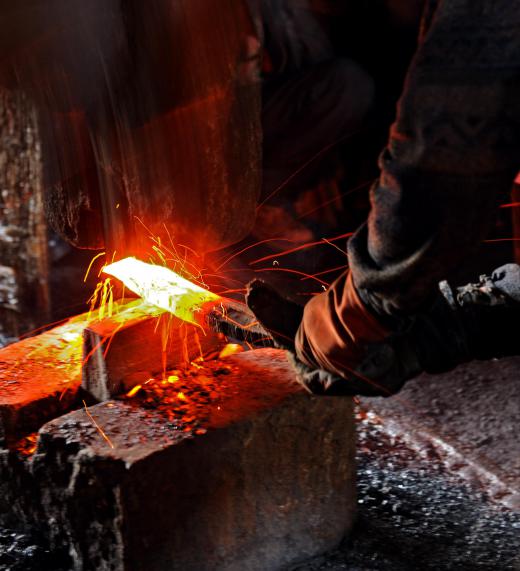A spring hammer is a mechanical hammer that is usually powered by the coil and recoil of a spring loaded handle. It can also be powered through the use of compressed air. Compressed air is most commonly used in modern mechanical spring hammer designs.
Earlier spring hammers required the user to engage the device with an initial motion. This motion caused the spring mechanism the hammer was attached to at the handle to begin the coil-recoil action. Due to the fact that each one of these actions had an apex point, or point where the force is at its greatest, a table or hammering block was typically placed either just at or after the point of apex in the hammer’s radius. This mechanism allowed the user to work more quickly on time-sensitive projects, such as hammering an iron pan while it was still hot enough to be formed.

The original spring hammer designs were often used in blacksmithing shops, especially in the bladesmithing specialties. The blade blank would come out of the coals red hot and have to be pounded with a hammer so the blade itself could be formed before it cooled. Speed of forming the blade often posed a problem for smiths who weren’t able to perform the functions efficiently, until the spring hammer came into use in commercial applications. The user could engage the spring hammer with one hand and then use both hands to more evenly form the blade while it was still hot enough to be formed, decreasing the amount of times a blade blank had to be treated or applied to intense heat.
More advanced spring hammers use compressed air to perform the initial motion, with the spring hammer itself being engaged with the pull of a trigger. The compressed air pushes the hammer head out of the cylinder, causing the spring behind the hammer head to pull it back through the force of the compressed air. Once the spring is recoiled, it gives in to the weight of the air pressure again, allowing the process to become an automatic action.
A modern hammer can engage itself through its own movement, as long as the air pressure is used to force the hammer head out of the cylinder. These types of hammers are used in various industrial settings. The technology has also been transferred to the construction or demolition fields in the form of the jack hammer, which is essentially a vertically designed spring hammer.
